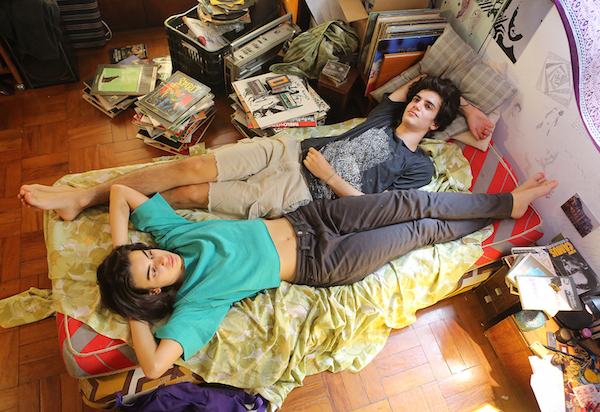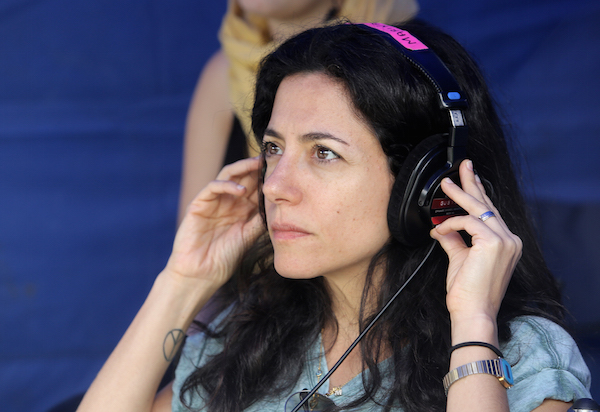
BY SEAN EGAN | “You kind of plan everything,” says Marina Person, a Brazilian writer/director, on independent filmmaking. “But a lot of unpredicted things happen as well, and you have two ways of dealing with it. One: to get desperate and cry in the sidewalk, saying ‘I’m not gonna make it because we’re not gonna have the scene I really needed.’ Or you can [go] like, ‘Ah! What can I do?’ and invent something else. That happened a lot in ‘Califórnia,’ because we shot with so little money.”
That wonderful, personal coming-of-age film, which Person co-wrote and directed on a shoestring budget, will receive its US premiere at the Tribeca Film Festival against the odds of budgetary constraints.
“If something goes really wrong, just relax, and try to look to the sides. The solution may be right in front of you,” she advises.
From filming largely indoors to keep costs down, dealing with inclement weather, and shooting guerrilla-style on the street without permits, Person employed her own wisdom against numerous obstacles. However, most difficult (and important) of all for Person, a former MTV Brasil VJ, was the process of acquiring music rights. Set in early-80s São Paulo and centering on Estela, a music-obsessed teen, “Califórnia” firmly establishes its tone through the use of choice cuts from alternative and new wave artists — including Echo & the Bunnymen, Cocteau Twins, and New Order.
Most tricky in Person’s long quest to curate the perfect soundtrack was securing the rights to The Cure’s “Killing an Arab.” The song, inspired by Camus’ “The Stranger,” has been mired in controversy since its release, due to racist misinterpretations of the song’s lyrics. Because in “Califórnia” it accompanies a particularly moving sequence and helps to define a major character, Person reached out to The Cure’s people before filming to receive tentative permission to use the song. However, by the time she was in post-production months later, and had the cash to secure the rights, she was greeted with an altogether different reaction.
“The answer was like, ‘What?! You cannot use it! What?! Who told you you could? You know [Cure frontman] Robert Smith wants to forget he wrote a song called “Killing an Arab.” ’ They were really upset,” she reveals, postulating that the Charlie Hebdo attacks may have rendered parties more wary of giving the go-ahead. Nonetheless, she did not give up.
“I said, ‘No, you know, you have to! I’m going to London and, like, go on strike. I’m going to do a hunger strike in front of Robert Smith’s house; he must let me use it!’ I was kind of desperate,” she recalls.
Following this rejection came a weeks-long process, during which Person scribed several extensive emails detailing her reasoning behind wanting to use the song, which found their way to Smith — who tried to convince Person to use a different Cure track in its place instead. After much debate and handwringing, she was eventually granted permission, which brought Person some much-needed relief.
“I couldn’t sleep, I couldn’t eat. I was totally obsessed with it.”
She was similarly obsessed with (and troubled by) getting the rights to David Bowie’s simultaneously melancholic and triumphant “Five Years.” This time around, Person was able to snag the rights to the composition, but was rejected in her efforts to secure the studio recording.

After another desperate, weeks-long process appealing to the powers that be and receiving radio silence, Person got creative and made due with the resources she had. She recruited Clara Gallo, the actress who plays Estela, to record a simple acoustic guitar-based cover, which was used for most of the film’s early festival screenings in lieu of the original recording. Then, out of the blue, the label changed their tune.
“Somehow, in November, somebody said, ‘Oh, do you want to use “Five Years?” We have this version that is in “Ziggy Stardust.” ’ I said, ‘Version?! Yes! What?! This is the original! This is the one I want!’ ” she explains, confirming that it would be present in the Tribeca cut. “I don’t know what happened, really I don’t. It was like a miracle.”
Visually, the film bursts with a love of music and ’80s culture — from stacks of records in a local shop, to posters of Estela’s musical idols lining her wall. Ever budget-conscious, Person helped keep costs down by providing resources from her own personal collection whenever possible.
“Most of the records that appear, that stand out in the music store, are mine. I kept them from my youth,” she says. “Some of the Bowie photos that are cut from magazines are mine. I still have, you know, an archive with all the Bowie things I collected.”
Every detail of the scenic design feels similarly lived in, in order to recreate 1984 — a “very special year in Brazilian history,” according to Person, due to the downfall of the military dictatorship, the rise of a new rock scene, and the emergence of AIDS.
“The movie’s not about AIDS, the movie’s not about politics, the movie’s not about any of that,” she quickly notes. “But those things were important to me, and I wanted them to be present. The movie is essentially about a girl becoming a woman.”
This use of a very specific socio-economic period as a backdrop for a simple story — along with its slice-of-life vibe and Person’s gentle, matter-of-fact directing style — recalls Richard Linklater’s work. Person also cites Francois Truffaut, and John Hughes’ “The Breakfast Club,” as inspirations in her filmmaking.
“I guess I’m influenced by everybody — all the filmmakers I love,” she comments of these touchstones. “Nothing seems to be happening, but this is life, right? You know, there’s nothing special here, there’s no turning point; but life is made of these moments, right? I like that kind of film.”
Ultimately, the strength of “Califórnia” is not derived from any amount of art direction, song choice, or inspiration; it’s from the elegant universality at its core.
“Essentially, we talk about things that everybody has gone through, or will go through if they are younger. You know, the teenage rites of passage,” Person says. “All the time you are asking yourself ‘Where am I? Where am I supposed to be? Is it here? What kind of person do I want to be?’ And so, these things, I hope people can connect to that.
“Califórnia” screens Sat., Apr. 16 at 6 p.m., Mon., Apr. 18 at 9:15 p.m., and Fri., Apr. 22 at 7:15 p.m. at Regal Cinemas Battery Park (102 North End Ave., at Vesey St.). Screens Thurs., Apr. 21 at 3:45 p.m. at Bow Tie Cinemas Chelsea (260 W. 23rd St., btw. Eighth & Ninth Aves.). Visit tribecafilm.com or call 646-502-5296 for tickets ($20 plus $3.50 phone or web processing fee; $10 for the Apr. 21 matinee, plus processing).






























